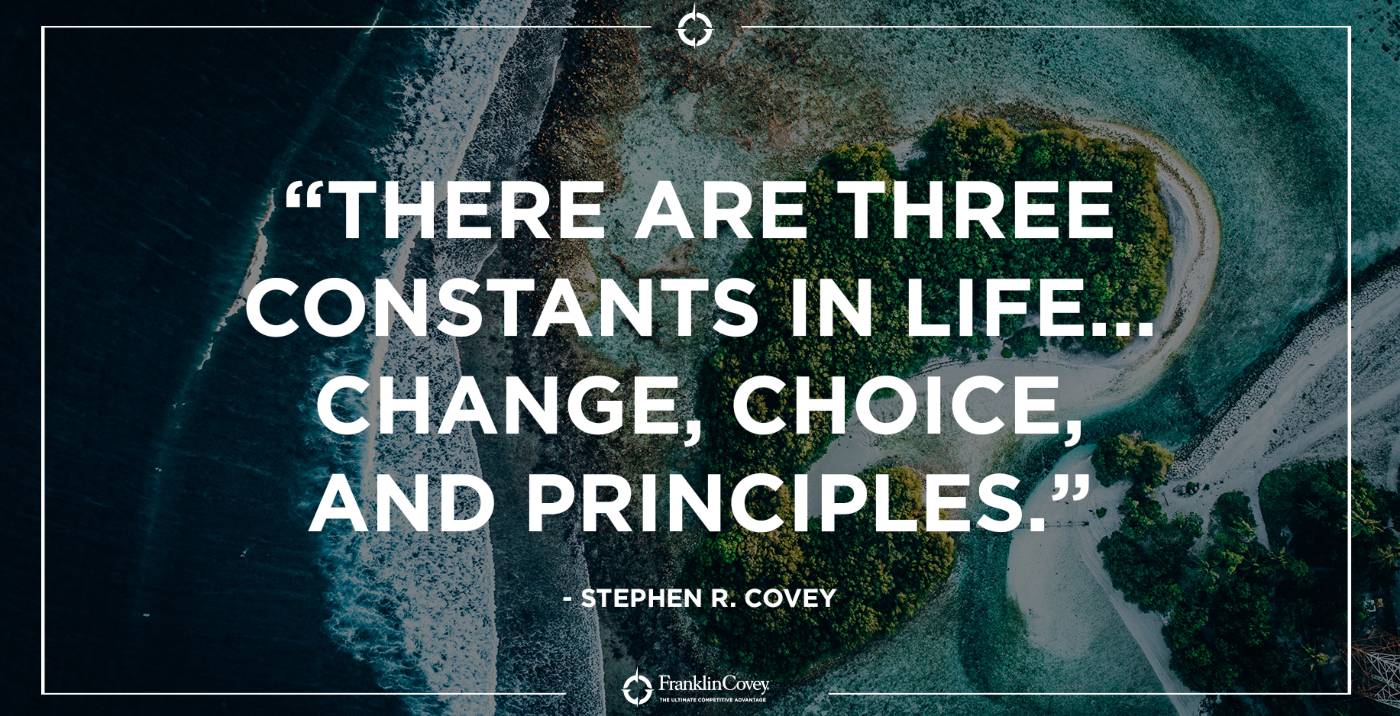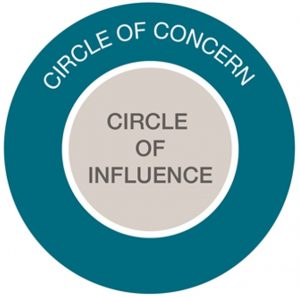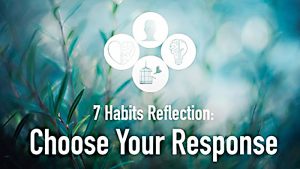How Do We Balance Our Lives In A Very Unbalanced World? Part 2
Author: Connley Skeen
June 2, 2020

“How many of us were already in crisis mode before we were told to close schools, cancel high school and collegiate sporting events, proms, graduation ceremonies, shut down all professional sports, and even close Disney World?”
Our choices (and the change that flows from those choices) define the very nature of our success in life or potential pot-holes that get in the way of our pace. We’ve all heard people in our lives complaining about the multitude of tasks they need to accomplish in a given day. And we may have thought to ourselves that everything they accomplished or committed to was ultimately their choice. When examining Dr. Covey’s work in Habit 1, Be Proactive, you quickly see how easy it is to feel hounded by simple tasks, unplanned Quadrant 1 crises, and even just the daily grind of being human. I have found myself looking at my own calendar and travel schedule and at times feel hounded by daily events that conflict with things I might really want to do.
Quick exercise: I want you to think back to any meeting you attended in the fall of 2019. Let’s assume this was a meeting that you, beforehand, worried might not be a good use of your time. Despite this, you decided to go to the meeting because your attendance was expected. You made a choice, but you knew it was a waste of your time. You went to the meeting because you felt the consequences of not attending the meeting outweigh the time you could have saved. The bottom line here: you chose to go. So where does this leave us? Perpetually hounded and frustrated? We can lean on Dr. Covey and the Habits for help here too, when they tell us that if we cannot fix or change the situation, we must embrace it.
 You can start with your own circle of influence…and the meetings you schedule. Ask yourself: “when I host a meeting or event, does everyone in attendance really know the “why” behind the meeting and their role while attending?” The “why” should be the spirit of the meeting and the reason people choose to attend. It is always easy to get caught up in over-examining an issue that might seem on the surface to be trivial. You have a meeting? Just go. You have a dental appointment? Just go. However, that is not my point. How you behave while doing tasks or events you dislike or dread demonstrates your character to those around you. Life isn’t always fair, and every profession has meetings” and moments in the year that seem to be more hectic than others. For example, I don’t want to be an accountant in March and April, just like I wouldn’t want to work in a retail establishment during December. The same holds true in education. The stress and pressure of late October each year or during “testing season” in the spring are times when we might question our choice of being an educator. It is worth remembering, in these moments of frustration, the “why” that got you into teaching in the first place. Use that to drive what you chose to get out of the meeting or event, and center it in the ones you schedule. In this way, you are controlling what you do and get out of a situation that could otherwise make you feel helpless. By doing this, you are also – hopefully – helping yourself to react positively and appropriately to the meeting and your participation in it.
You can start with your own circle of influence…and the meetings you schedule. Ask yourself: “when I host a meeting or event, does everyone in attendance really know the “why” behind the meeting and their role while attending?” The “why” should be the spirit of the meeting and the reason people choose to attend. It is always easy to get caught up in over-examining an issue that might seem on the surface to be trivial. You have a meeting? Just go. You have a dental appointment? Just go. However, that is not my point. How you behave while doing tasks or events you dislike or dread demonstrates your character to those around you. Life isn’t always fair, and every profession has meetings” and moments in the year that seem to be more hectic than others. For example, I don’t want to be an accountant in March and April, just like I wouldn’t want to work in a retail establishment during December. The same holds true in education. The stress and pressure of late October each year or during “testing season” in the spring are times when we might question our choice of being an educator. It is worth remembering, in these moments of frustration, the “why” that got you into teaching in the first place. Use that to drive what you chose to get out of the meeting or event, and center it in the ones you schedule. In this way, you are controlling what you do and get out of a situation that could otherwise make you feel helpless. By doing this, you are also – hopefully – helping yourself to react positively and appropriately to the meeting and your participation in it.
Now, think back to that dreaded meeting you experienced last fall. If that meeting was the first or only time someone interacted with you, how would they remember you? How would your students view your behavior and/or demeanor if they saw you in that meeting? We know that meetings are typically held to initiate change, and how you behave and interact is directly connected to your choices. Now, think about the principles you admire in others or in yourself? Dr. Covey defines principles as timeless, unchanging, and constantly relevant – whether we accept them or even comprehend them in the first place. They are the universal language of the world. For example, history has taught us that the principle of integrity and that its definition has remained unchanged since the beginning of time, in every single corner of the world. The same holds true for honesty, patience, empathy, etc. If you have your The 7 Habits of Highly Effective People participant guide near, turn to page 13 for examples of principles that align directly with each of the 7 Habits. It is important to remember the connection between timeless principles and the timeless 7 Habits. For example, Being Proactive, has the same meaning and connotation as taking Responsibility or exercising Initiative. When you are using the Habits to act within your circle of influence, it gives you the space to react in alignment with the principles that are most important to you. In doing so, you convey those principles (and your character) to those around you.
This year, in the second week in March, when our world suddenly became very unbalanced, how many of us were prepared for what unfolded during that 5-6 day stretch, or what has transpired over the last 50+ days? Think of all the change that has transpired in your own personal and professional life. Imagine someone telling you in February of this year that the world we knew then would now be totally unrecognizable. I hope you remember how you feel now when the world starts to balance itself in the coming months and we become re-used to the things we’ve always taken for granted. I hope that we can all use it to grow in ways that make us more deliberate in what we allow back into our lives, more resilient when things are challenging or adverse, and more comfortable with the growth that change requires from all of us.
My maternal grandfather would always tell me, “Connley, change is going to happen, but growth is an optional choice.” How will you choose to grow today? How many of your 1000 daily choices will produce growth? And how can you use the core principles in your life to help stabilize your day-to-day decision-making – whether it is in a faculty meeting, sitting in a dentist chair, or starting and/or following through with an exercise regimen?
And most importantly, how will you balance your life in a very unbalanced world?
I would like to share a few things to add some perspective to the choices you make each day, and I invite you to have authentic conversations about this topic within your circle of family and friends. I have included links to videos that can be accessed on LeaderinMe.com for current Leader in Me educators interested in deeper learning on these topics!
Let’s get started.
TIPS
“ We must embrace change, or change will embrace us and not let go!”
Follow (videos available to Leader in Me Community) these links for video reinforcement and ideas:
 Your Seat of Choice – classroom connection
Your Seat of Choice – classroom connection
 7 Habits Reflection: Choose your Response – personal connection
7 Habits Reflection: Choose your Response – personal connection
- Can you Measure your MOOD? Have you ever visited an emergency room with a painful ailment or illness? Typically, one of the first things you will be asked to do is measure your pain level using a 10-point scale. A 10 would represent the most extreme pain you have ever experienced, and a 1 would indicate no pain. In that moment, you are using the GIFT of self-awareness. By scanning your mind and pain history, you can quantify the level of pain you are experiencing at that very moment. The number you provide to the health-care professionals is used to determine how they will initially treat you. The same self-awareness scale can be used to measure your moods, which ultimately will influence your immediate choices. In this example, we can flip the scale and a 10 would be the BEST mood ever or Party in your Head, and a 1 could represent the worst mood ever or A Walking Coma. Try it: it really works! Make sure to share your insights and scale with friends and family members so they know how to treat you emotionally.
- What is your hashtag? Do you have a saying or phrase that defines the person you are to yourself and others? Typically, most of us can really relate to, and live by, some well-defined principles. Quick reference: The 7 Habits of Highly Effective People participant guide, page 13.
- What is the BEST option? There are times when we have to make some tough choices. Instead of always looking at the choice negatively, turn it around and ask yourself, “What is my BEST option, considering the situation?”
- Blowing out someone’s candle doesn’t make yours shine any brighter. The choices you make each day define the type of person you are to the world. Be kind, and kindness follows. Replace the previously underlined words with: Rude, Mean, Unhappy, etc.
Growth Opportunity and Family/Accountability Partner questions?
- Watch 7 Habits Reflection: Choose your response with a family member or close friend. Together, answer the questions that are prompted during the video.
- Share and discuss Tips 1 & 2 above with a family member or a close friend. What are the advantages of being more self-aware and living up to the principles you admire in yourself?
Levity
- An elderly neighbor of mine often reminds me of his favorite saying,“You start to STINK if you are always sniffing for STINK!” In other words, choose to sniff the happier side of life.
Connley Britt Skeen, Senior Education Consultant
[email protected] Twitter- @cbskn
LINK to Chapter 1 – How do we balance our lives in a very unbalanced world? ”There is no bell schedule at my home address”
Share Article on
Tags: 7 Habits of Highly effective People, professional development, wellness-leadership
